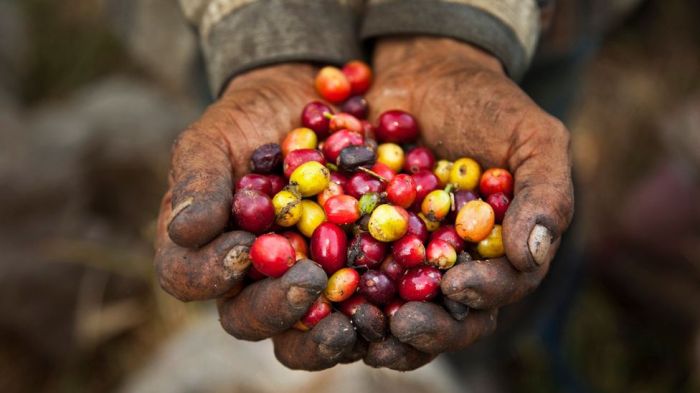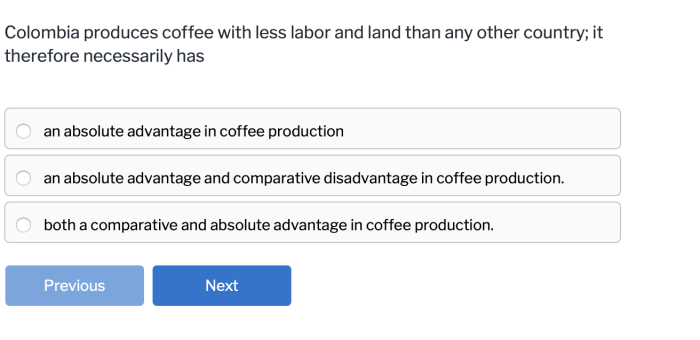Colombia produces coffee with less labor – Colombia’s coffee production stands out globally due to its remarkable efficiency, achieved through innovative practices that minimize labor requirements. This approach not only enhances economic competitiveness but also promotes sustainable farming methods and social well-being within coffee-growing communities.
Colombia’s coffee industry has consistently maintained a lower labor force compared to other major coffee-producing nations. This efficiency is attributed to factors such as mechanization, sustainable farming techniques, and a skilled workforce.
Colombia’s Coffee Production Efficiency

Colombia’s coffee industry has consistently maintained a low labor requirement compared to other major coffee-producing countries. This efficiency stems from a combination of factors, including:
Mechanization and Technology
- Colombia has invested heavily in mechanization, employing advanced harvesting and processing technologies.
- Automated machinery and equipment reduce the need for manual labor in tasks such as picking, sorting, and drying.
Skilled Workforce
- Colombia has a highly skilled workforce in the coffee sector, with generations of experience and knowledge.
- Farmers employ efficient practices and techniques, maximizing productivity with minimal labor input.
Favorable Climate and Geography, Colombia produces coffee with less labor
- Colombia’s ideal climate and topography allow for multiple harvests per year, extending the production season.
- The country’s mountainous terrain promotes natural drainage, reducing the need for extensive irrigation and labor-intensive maintenance.
Sustainable Practices in Colombian Coffee Cultivation

Colombia’s commitment to sustainability extends to its coffee cultivation practices, which further reduce labor needs:
Shade-Grown Coffee
- Shade-grown coffee promotes biodiversity and protects the environment.
- Shade trees provide natural protection against pests and diseases, reducing the need for chemical inputs and manual pest control.
Organic Farming
- Organic farming practices minimize the use of chemical fertilizers and pesticides.
- This approach promotes soil health, reducing the need for labor-intensive soil preparation and maintenance.
Economic Benefits of Efficient Coffee Production

Reduced labor costs provide significant economic advantages for Colombian coffee farmers:
Increased Profitability
- Lower labor expenses increase profit margins, allowing farmers to invest in their operations and improve their livelihoods.
- Savings can be reinvested in technology, training, and infrastructure, further enhancing efficiency.
Competitive Advantage
- Lower production costs give Colombian coffee a competitive edge in the global market.
- Farmers can offer high-quality coffee at competitive prices, increasing demand and market share.
Social Implications of Reduced Labor

While reduced labor requirements have economic benefits, they also raise social implications:
Job Displacement
- Mechanization and technology can lead to job displacement in the coffee sector.
- Farmers need to adapt to new skills and explore alternative employment opportunities.
Impact on Traditional Culture
- Coffee cultivation has been a cornerstone of Colombian culture for centuries.
- Reduced labor needs may affect traditional community dynamics and the social fabric of coffee-growing regions.
Future Trends in Colombian Coffee Production: Colombia Produces Coffee With Less Labor
The future of Colombian coffee production is likely to see continued advancements in technology and sustainable practices:
Technological Innovations
- Emerging technologies, such as precision agriculture and data analytics, will further enhance efficiency and productivity.
- Robotics and automation may play an increasing role in harvesting and processing operations.
Sustainability and Climate Change
- Climate change may impact labor requirements, as extreme weather events and changing growing conditions require adaptation.
- Sustainable practices will remain crucial in maintaining soil health and reducing the need for labor-intensive interventions.
FAQs
Why does Colombia require less labor in coffee production?
Colombia’s coffee industry benefits from mechanization, sustainable farming practices, and a skilled workforce, resulting in lower labor requirements compared to other coffee-producing countries.
How do sustainable farming methods reduce labor needs?
Shade-grown coffee and organic farming practices promote soil health and reduce the need for chemical inputs, minimizing labor requirements for pest and disease control.
What are the economic advantages of efficient coffee production for Colombian farmers?
Reduced labor costs allow Colombian coffee farmers to invest in their operations, improve their livelihoods, and contribute to the overall competitiveness of Colombian coffee in the global market.